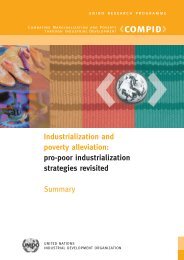Manual on the Development of Cleaner Production Policies ... - Unido
Manual on the Development of Cleaner Production Policies ... - Unido
Manual on the Development of Cleaner Production Policies ... - Unido
You also want an ePaper? Increase the reach of your titles
YUMPU automatically turns print PDFs into web optimized ePapers that Google loves.
DEVELOPMENT OF CP POLICY<br />
MODULE 3: CP POLICY DEVELOPMENT CYCLE<br />
Background<br />
The widespread adopti<strong>on</strong> <strong>of</strong> CP can be achieved through a combinati<strong>on</strong> <strong>of</strong> mechanisms and acti<strong>on</strong>s,<br />
including a str<strong>on</strong>g and clear regulatory framework as well as effective incentives for polluters to<br />
change <strong>the</strong>ir behaviour voluntarily. It bears repeating that <strong>the</strong> framework and instruments should take<br />
into account local traditi<strong>on</strong>s, culture and <strong>the</strong> capacity to administer policies. Naturally, incentives and<br />
instruments should not be geared to <strong>the</strong> mere support <strong>of</strong> end-<strong>of</strong>-pipe measures, but at <strong>the</strong> same time <strong>the</strong><br />
path <strong>of</strong> acti<strong>on</strong> selected should not be perceived as competiti<strong>on</strong> between regulati<strong>on</strong> and CP.<br />
The range <strong>of</strong> policy instruments is wide, as dem<strong>on</strong>strated in module 4. Each country will need to apply<br />
<strong>the</strong> mix <strong>of</strong> policies and instruments best adapted to its circumstances. The policy group should identify<br />
and propose an appropriate mix <strong>of</strong> ec<strong>on</strong>omic instruments and normative measures such as laws,<br />
regulati<strong>on</strong>s and standards, as well as informati<strong>on</strong>-based instruments. Incentives to stimulate <strong>Cleaner</strong><br />
Producti<strong>on</strong> could include grants, loans and favourable tax regimes as well as targeted technical<br />
assistance to relevant industrial enterprises. Awareness-raising and voluntary initiatives should also be<br />
encouraged. Informati<strong>on</strong> and educati<strong>on</strong> campaigns are important policy instruments.<br />
Before introducing new policy instruments, <strong>the</strong> policy maker should review any incentives and<br />
mechanisms that may already be in operati<strong>on</strong> (this would have been d<strong>on</strong>e in <strong>the</strong> earlier analysis). It<br />
may be easier to modify existing instruments so that <strong>the</strong>y support CP, than to create new policy<br />
instruments. Similarly, it may be a viable approach to modify existing financial programmes that<br />
support end-<strong>of</strong>-pipe projects, by requiring <strong>the</strong> implementati<strong>on</strong> <strong>of</strong> CP prior to granting support for end<strong>of</strong>-pipe<br />
measures. O<strong>the</strong>r possible ideas are presented below.<br />
EXAMPLE<br />
How to modify regulatory instruments to promote <strong>Cleaner</strong> Producti<strong>on</strong>:<br />
A number <strong>of</strong> regulatory instruments currently in use can be modified to encourage polluti<strong>on</strong><br />
preventi<strong>on</strong> and CP, ra<strong>the</strong>r than simply aiming to mandate polluti<strong>on</strong> c<strong>on</strong>trol. Some opti<strong>on</strong>s that have<br />
been used around <strong>the</strong> world include:<br />
(a) Mandatory review <strong>of</strong> applicability <strong>of</strong> <strong>Cleaner</strong> Producti<strong>on</strong> within <strong>the</strong> permitting process;<br />
(b) Regulati<strong>on</strong> <strong>of</strong> emissi<strong>on</strong>s by mass instead <strong>of</strong> c<strong>on</strong>centrati<strong>on</strong>, to encourage reducti<strong>on</strong> ra<strong>the</strong>r than<br />
diluti<strong>on</strong>;<br />
(c) Envir<strong>on</strong>mental impact reports;<br />
(d) Permits for all hazardous emissi<strong>on</strong>s;<br />
(e) Public disclosure <strong>of</strong> standard emissi<strong>on</strong>s, inputs and efficiency <strong>of</strong> <strong>the</strong>ir use, as well as any spills,<br />
releases, or accidents;<br />
(f) The training <strong>of</strong> envir<strong>on</strong>mental inspectors to identify and recommend polluti<strong>on</strong> preventi<strong>on</strong><br />
opportunities;<br />
(g) Enabling companies to spend m<strong>on</strong>ey from penalties and fines <strong>on</strong> cleaner producti<strong>on</strong> initiatives;<br />
(h) Polluti<strong>on</strong> regulati<strong>on</strong> through ec<strong>on</strong>omic instruments instead <strong>of</strong> command-and-c<strong>on</strong>trol;<br />
(i) Introducti<strong>on</strong> <strong>of</strong> an integrated permitting approach (see IPPC).<br />
In designing <strong>the</strong> mix <strong>of</strong> policy instruments, particular attenti<strong>on</strong> should be paid to those instruments<br />
that can help create a demand for cleaner, more eco-efficient products and processes. Depending <strong>on</strong><br />
<strong>the</strong> circumstances, this could include: streng<strong>the</strong>ned public access to informati<strong>on</strong>; disseminating<br />
informati<strong>on</strong> <strong>on</strong> envir<strong>on</strong>mental management successes; and public procurement policies that give<br />
preference to “green” products. Likewise, permits requiring envir<strong>on</strong>mental management programmes<br />
provide str<strong>on</strong>g incentives for c<strong>on</strong>tinuous envir<strong>on</strong>mental improvement within enterprises, while<br />
PAGE 70
















